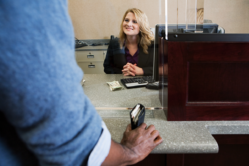When I logged into my USAA joint checking account to pay a bill, I noticed three large transactions. My first thought was that my wife had gone shopping. But she isn’t the type of person to spend more than $1,000 on three separate transactions at the same store, on the same day – in another country.
I was the victim of fraud.
What To Do if Your Debit Card is Stolen
I am very careful about how and where I use my debit and credit cards. I almost always prefer to use my credit card over my debit card because they offer better consumer protections and better cash rewards.
I usually only use my debit card for ATM withdrawals. In fact, I distinctly remember one of the last times I used it to make a purchase. It was several years ago and I received a call from the card’s fraud department as I was leaving the store (I hadn’t used the card for a purchase in a long time, and I made the purchase in another state while on vacation, so the card company’s software flagged the transaction and their department called me).
But your debit card can be stolen even if you’re careful. Thieves may, for example, plant a virus onto your computer, hack into a third-party system that stores your debit card information or they could skim your card number when you make a purchase at a restaurant. Or you could simply lose your wallet.
In my case, I’ll never know how my debit number was stolen. But, my number was most likely compromised as part of a larger data breach.
First Step: File a Fraud Report
The first step is to report the theft immediately. This will limit the damage to your account, get the ball rolling on having your money replaced in your checking account (it can take a few days), and get a replacement card sent to you.
Filling out a fraud report was easy – it took about 20-25 minutes and the customer service rep handled the entire process over the phone.
Why Credit Cards Offer Better Protections Than Debit Cards
These thieves stole more than $1,000 from my checking account. Thankfully, we had enough money in our account to cover the temporary loss.
But we were lucky. Had we not noticed it, we could have bounced checks and faced overdrafts fees and embarrassment. This shows why I primarily use credit cards, as they offer better consumer protections against fraud (read the FTC guidelines for stolen credit and debit cards for consumer responsibilities).
When your credit card number is stolen, the disputed charges should be removed from your available balance, which allows you to continue spending as you normally would.
With debit cards, however, the stolen money is immediately taken out of your account. It can also take some time before you get the funds replaced, which can create a financial nightmare.
Credit cards have other benefits, including cash back or rewards programs, and special programs such as rental car insurance, purchase protections and more.
These are some of our recommended credit cards for military members. They offer great rewards and excellent consumer protections. However, I only recommend using credit cards if you can (and will!) pay your balance in full each month.
An Inconvenience, But No Serious Harm Was Done
In the end, this is an inconvenience for me, and for USAA. But I didn’t lose any money. I got the money back in my account in a few days. I also had to cancel my ATM/Debit card, and I will get a new one in about a week or so.
Other than that, it was a half-hour of my time and the hassle of not having a debit card for a week. I didn’t have any automatic payments routed through that card, so I didn’t need to cancel or set up any new payments, which would have been a big hassle. Thankfully, I had enough money in my account. I don’t want to think about what would have happened if either of those had not been the case.
Photo credit: Don Hankins.



Comments:
About the comments on this site:
These responses are not provided or commissioned by the bank advertiser. Responses have not been reviewed, approved or otherwise endorsed by the bank advertiser. It is not the bank advertiser’s responsibility to ensure all posts and/or questions are answered.
Izzy says
Nice to know that your bank took csre of i used green dot bank prepaid and someone stole my identity and card info and made 1000 in transactions in person at a store with a bogus card. Not just that they withdrew 300 at a atm. Aftwr i reported it the same day green took 14 days of giving me the run around till they sent a letter denying my claim smh
Nina says
The same thing just happened to me. Except , I had my debit card this whole time. But I guess someone from somewhere found my debit card number somewhere and spent $795 on something called London Borough/Green. No idea, but I called USAA and they’re in the process of fixing it!
Gwen H says
Thanks for writing this! After my debit card was just rejected at the gas station and then the commissary this evening (yes, I was silly enough to try twice because I KNEW just how much money we had yesterday), we discovered we had a very similar situation to what you’re describing! Three large transactions on our account to two different CVS and one Rite Aid pharmacies in New Jersey. We are currently stationed in Guam. Guam. But to my embarrassment, USAA did not call us, they simply blocked the funds to our account, causing me deep humiliation at the check-out counter while trying to splurge on a bag of King Crab Legs for my birthday. They took over $1,200 from our account before USAA shut it down without notice. But I still love them (USAA), because at least I know we’ll get our money back and we didn’t have to defend ourselves. This is the 2nd time this has happened to us being overseas though. We changed the numbers and it happened again… I wish I could figure out what we’re doing wrong, but I think we may resort to your credit-card-only tactic. Thanks for the advice!
Ryan Guina says
Gwen, Thanks for sharing your story – I’m sorry to hear this happened to you, but it’s good to know that you should be covered for the fraudulent expenses. As I mentioned in the article, I primarily use credit cards because of the additional protections, as well as the cash back benefits. I recommend this as a solution – but only if you have the discipline to pay your card in full each month. Otherwise the interest and fees aren’t worth it!
The other recommendation is to be as careful as possible when and where you use your cards (credit or debit). I don’t recommend using them over open air wi-fi connections like at a restaurant, coffee shop, or library. You might also consider using cash at stores “off the beaten path” if you aren’t familiar with them. The final recommendation is to regularly check your computer for malware and use an anti-virus software program to help prevent attacks (there are many great free programs such as Avast and AVG).